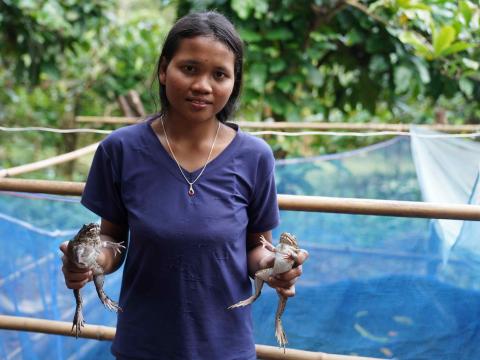Frogs put a smile on children and mothers in rural Laos

Grilled or soup frogs with sticky rice for lunch puts a smile on the faces of Kanta, 21, and her 8-month-old daughter Vou. Frogs raising is not only a source of nutritious food for their family but also a good source of income.
High needs are observed in maternal and child health in Laos, with high rates of malnutrition in children under 5 years old: 32.8% of them are stunted, 10.8% wasted, and 24.3% are underweight according to the latest Lao Social Indicator Survey III (LSIS-III) conducted in 2023. All these indicators are alarming signs, with the highest prevalence of malnutrition in children in the East Asia region.
“Child health is closely linked to family income levels,” says Yao Moua, SNAP Project Manager for World Vision. “When families don’t have knowledge and any money, they are often unable to provide a wide variety of nutrients for their children and keep them in school.”
In Samoui district, Saravane province, those indicators were at an even more alarming level a couple of years ago, with three out of five children under 5 suffering from chronic malnutrition, preventing them from healthy growth and development, and leading to significant deficiencies that will jeopardize the future of their dreams.
Kanta, 21 years old, is part of the twenty families who piloted the frog-raising activity in 2023. The SNAP project, funded by the New Zealand Ministry of Foreign Affairs and Trade, provided training to the village members about how to raise and care for small animals.
“We focus on promoting the raising of small animals in the family such as chickens, ducks, frogs, and fish, creating strong technical skills, using resources available in the area, saving the cost, giving quick results to improve the nutrition for children and pregnant women and move towards sustainability,” said Phoutthavong Nachampa, SNAP Food Security and Livelihood Coordinator.
Through poultry raising, farmers were trained on raising, taking care of, and breeding the poultry to improve their family’s food security and sell the excess poultry for much-needed income. After the training, the families received frogs and feeding equipment.
“After the training, I found that raising poultry is not as hard as I thought, they just need good care, like our children, and it is not just a good source of food that we can have any time that we want, but we can easily sell the it if we need money to buy things,” Kanta added with a smile.
“In the past, my family didn’t have enough food, we relied on natural sources of food, and it was very difficult to look for nutritious and diversified food. I also lacked knowledge on how to take care of my health, I was working hard and did not eat enough so I fell sick very often. I did not seek pregnancy check-ups during the first three months carrying my first child. The health centre is located far from the village and we needed to take the boat to cross the river,” shared the young mother.
“Small animal raising is a low-cost investment, they are easy to care for, and women and children benefit from it the most. It takes only three to four months for the family to use it for food or sell at the market or to neighbours within their community” said Phoutthavong Nachampa.
As part of the integrated nutrition approach taken by the SNAP project, Kanta has not only been trained in small animal raising but recently joined the Go Baby Go group of her village, where she learns about her child’s growth and development and how to make sure she gives Vou the best start in life. The mother equally received a push cart, which will significantly change her life by reducing her time and effort spent on domestic chores.
Little by little, Kanta and her community are witnessing the power of transformation development and can dream of a better future for the children of Samoui district. The latest data from Saravane Provincial Health Department suggests that now less than half of the children of Samoui are stunting, a promising testimony of a new dynamic initiated in the communities.